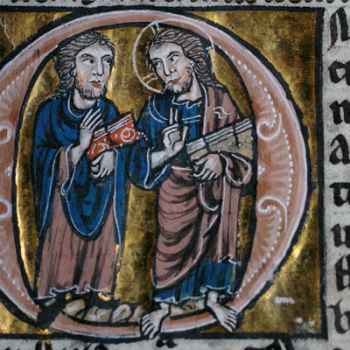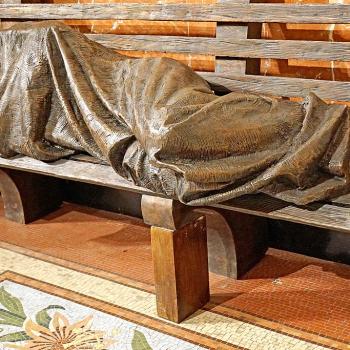
Just the other day I heard that Belmont University was being criticized by Rep. Andy Ogles; he said that the university should be investigated for violating Trump’s anti-DEI rules. It immediately brought to my mind the time I spent a summer in Nashville working with refugees who were mostly but not exclusively Kurds. I had just finished my sophomore year in college, and I had signed up to do “mission work” through the Baptist Student Union (by the time the summer came, I knew I was going to become Catholic, but I did not when I initially signed up for the work). was assigned to a church right next to Belmont University, a church which was actively engaged with working for people in need (it had a food bank as well as its work with refugee families). The church and the university were working together; the university provided me a dorm room to stay at during the summer (which led me to talk to and meet with some of the students who were doing summer studies). The Kurds had been brought into the US through Catholic Charities, making the enterprise an ecumenical endeavor (which was one of the reasons why I felt fine continuing with the assignment). It was clear that the university was interested in putting its faith in practice (as with the church itself). I do not know much of what happened after that summer, and how much the university continued engaging such work, but I assume they continued in some fashion because it seems the university has worked with and promoted those in need, a reality which led to Ogles attacking the university for embracing DEI, saying that it is breaking Trump’s anti-DEI initiative and deserves to have any federal funding it has removed as a result.
Christian universities, if they engage the teachings of Christ, will be helping those in need. The values and principles promoted by Christ, those which tell us to treat people with dignity, to respect people despite their race, gender, or background, are seen reflected by DEI initiatives. Ogles, it could be said, is attacking Belmont University for following its religious beliefs and practices. He is trying to say they are anti-Christian (acting as if he gets to define the Christian faith) and in doing so, he, and those following him, are actively attacking the principle of religious liberty by saying only those who hold religious values he believes in should have such liberty affirmed. This might seem surprising to some, but it should not be because Republicans seem to be interested in using religious liberty as a defense only for those who promote their own ideological objectives, which is why they are quick to deny such liberty to others, like Muslims.
Christians should be helping those in need. This includes those who are poor, those who are homeless, and those who are imprisoned (especially those who are unjustly imprisoned or those who suffer criminal penalties which are disproportionate to the crimes they committed). This is why they must take a stand against the way immigrants are currently treated in the United States — even if immigrant came in “illegally,” the torture and abuse they receive, let alone the threat to their lives, is a far greater evil than anything which can be attributed to them, making the penalty unjust (and therefore, to be denounced for the evil it is). Christians should be seen in the world engaging true justice, not legal technicalities, and those Christians who do so should be protected by religious liberty instead of penalized. Sadly, many of those who like to invoke religious liberty are among the first to push for laws which penalize and forbid Christians feeding the hungry, helping the homeless, and showing care and concern for migrants.
I have, through the years, done all kinds of volunteer work; I have done so with the ecumenical spirit that took me to Belmont, working with Christians (and non-Christians) as they help those in need of comfort and care. This is why, when I was living in Silver Spring, Maryland, I would sometimes work at a local food bank giving not only food to needy people, but also talk to them, listen to their stories, and encourage each of them, affirming their inherent value. What made the activity ecumenical is that the food bank was run by a Lutheran church, and the church also had a shelter for abused women. Those who came to the church did not receive any proselytism, unlike what is done by some Christian food banks and charities; they were just cared for, making sure the people who were in desperate situations did not give into despair.
Sadly, with inflation, with tariffs, with the way farms are losing workers due to ICE raids, and, of course, the new laws put in place which make it more difficult to help those in need, food banks have been hit hard; they are finding more and more people are in need with less and less ability to help any of them. More and more people are losing their jobs (many who used to work in the government), even as more and more people are being kicked out of where they are living (with the government rolling back renter protections). Because more and more people ending up on the streets, the Trump administration knows it must do something. Instead of trying to people the help they need, instead of making sure jobs offer living wages, instead of making sure workers’ rights are protected, and instead of defending renters’ rights, the administration is taking aim at the homeless (and anyone they consider mentally ill), trying to find a way to get them off the streets, not by getting them work and a place to stay, but by institutionalizing them. What will happen to them? Will they have protections once they are no longer seem by the public? Is that likely with an administration which has demonstrated cruelty in its actions?
DEI initiatives are promoted in order to make sure the dignity of every human person is affirmed; they make sure there are just legal consequences for those who deny such dignity to any group of people (or, worse, promote some form of supremacy, such as white nationalism). The war being waged against DEI is a war against Christianity, being done by many of those who have complained about a war on Christianity – but those who have made such complaints have often used Christianity to excuse themselves from their civic duty (like taking the COVID vaccine) while denying the rights of Christians (or people of other religious faiths) when actual religious principles are at stake. Thus, when the Trump administration is seen as promoting the rich over the poor, in denying basic human rights to immigrants and refugees and the homeless, Christians must resist Trump and his anti-Christian policies. Why is it that those who have talked about the culture war, and used it to suggest Christianity has been under attack, do not seem to be interested to say a word against what Trump is doing? I cannot get out of my mind the way Christ would be treated by the current administration – he would be seen as a homeless wanderer, perhaps even an illegal immigrant, and treated with contempt, tortured and abused, and left for dead, or taken out of the public eye by being put into an institution. If anyone doubts that, all we need to do is remember Jesus said what is done to the least among us is done to him, and so it is exactly what is being done to him with the abuse being given to refugees, immigrants, and the homeless.
* This Is Another Post From My Personal (Informal) Reflections And Speculations Series
Stay in touch! Like A Little Bit of Nothing on Facebook.
If you liked what you read, please consider sharing it with your friends and family!
N.B.: While I read comments to moderate them, I rarely respond to them. If I don’t respond to your comment directly, don’t assume I am unthankful for it. I appreciate it. But I want readers to feel free to ask questions, and hopefully, dialogue with each other. I have shared what I wanted to say, though some responses will get a brief reply by me, or, if I find it interesting and something I can engage fully, as the foundation for another post. I have had many posts inspired or improved upon thanks to my readers.












